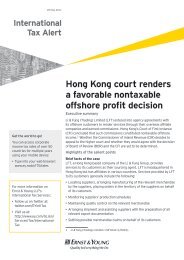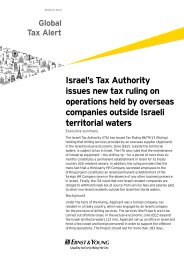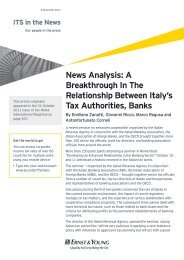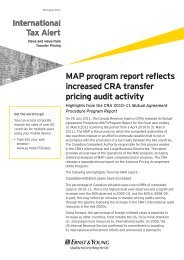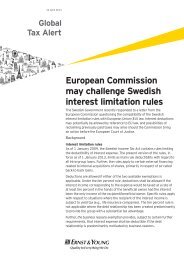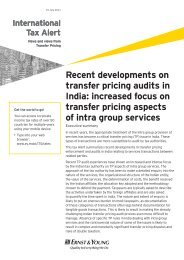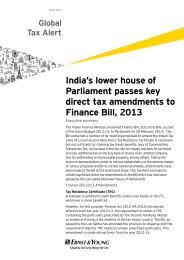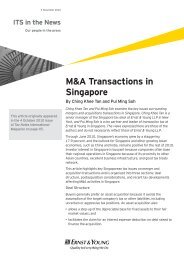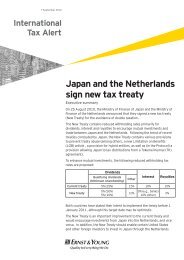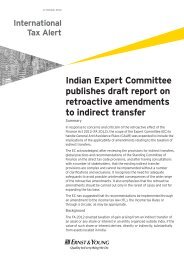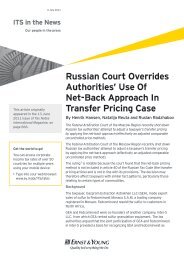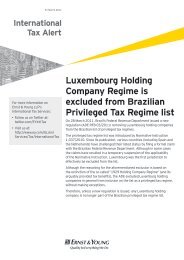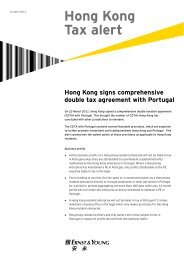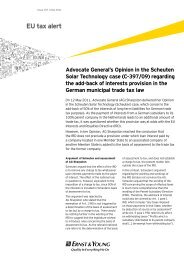Download - Ernst & Young T Magazine
Download - Ernst & Young T Magazine
Download - Ernst & Young T Magazine
You also want an ePaper? Increase the reach of your titles
YUMPU automatically turns print PDFs into web optimized ePapers that Google loves.
Focus Finances and tax risks<br />
The stateless<br />
employee<br />
A growing number of workers are nearly permanently on the road<br />
as their employers expand globally. This in turn raises considerable challenges,<br />
not least of which in terms of finances and tax.<br />
71%<br />
The proportion of expatriate<br />
workers who have experienced<br />
more complex finances since<br />
relocating abroad, according<br />
to HSBC.<br />
• By Andrea Chipman<br />
An era of rapid globalization has produced<br />
a new generation of “stateless<br />
employees.” These executives may be<br />
born in one country, live in another and spend a<br />
significant proportion of their working lives<br />
traveling from one continent to another, either<br />
as an expatriate on assignment or else simply as<br />
an executive constantly on the move. This<br />
nomadic workforce is increasingly valuable to<br />
companies, but can also pose headaches from a<br />
tax and benefits perspective.<br />
This challenge isn’t for the companies alone.<br />
Expatriate employees that move intermittently<br />
from one geographic assignment to another can<br />
face considerable difficulties in managing their<br />
personal finances too. Those who spend a lot of<br />
time overseas can have more complex personal<br />
tax affairs, may need multiple bank accounts,<br />
and can have difficulties with moving pension<br />
arrangements when they relocate. In a survey<br />
for HSBC International, 71% of expatriate<br />
employees said that their finances had become<br />
more complex since relocating. 1<br />
Salary arrangements may need to be split<br />
between home and host country, causing<br />
significant reconciliation work when tax returns<br />
are filed, to determine how much time the<br />
executive spent in each location. Certain<br />
compensation structures can make tax affairs<br />
even more complex. For example, if an executive<br />
receives deferred compensation in the form of<br />
equity, rather than cash, this can have tax<br />
consequences if equity awards are granted for a<br />
particular business year but vested over a longer<br />
period during which the employee changes<br />
location several times.<br />
Such issues can also crop up for so-called<br />
“accidental expatriates”, which relates to the<br />
phenomenon of executives who are ostensibly<br />
based in their home country, but which travel<br />
overseas frequently. Employees who are paid in<br />
their home country but do a lot of work overseas<br />
can trigger local tax liabilities, presenting a<br />
challenge to companies to find ways of tracking<br />
these individuals in order to be compliant. “We<br />
see more and more individuals who are on a<br />
domestic contract but overseeing a regional area<br />
with a lot of cross-border commuting that can<br />
expose them to local taxes,” says Nick Bacon, a<br />
Partner in EMEIA Financial Services-Human<br />
Capital at <strong>Ernst</strong> & <strong>Young</strong>.<br />
It may also be unclear how to account for the<br />
mobile employee’s time and costs, particularly if<br />
they move frequently. “If you have someone<br />
sitting in a legal entity in India, going to work for<br />
an entity in the same group in London, what<br />
happens to the individuals’ costs – are they borne<br />
by London or Mumbai?” asks Bacon. “If there is<br />
a supply of staff, it can give rise to a VAT reverse<br />
charge, where the host country would have to<br />
charge itself VAT on the deemed import of<br />
services from the home country.”<br />
There are also corporate tax risks for<br />
employers in the context of triggering a taxable<br />
presence (or permanent establishment) and<br />
impacts for their transfer pricing systems when<br />
high-value creating employees frequently travel<br />
and work abroad. “If you think about financial<br />
institutions sending project teams abroad to<br />
work on a large deal, they may be based abroad<br />
for weeks or months at a time. This could<br />
certainly attract the attention of local tax<br />
authorities during transfer pricing reviews or tax<br />
audits,” says Chris Price, the Head of Tax for<br />
<strong>Ernst</strong> & <strong>Young</strong>’s EMEIA Financial Services<br />
practice in London.<br />
Creating mobile retirement plans<br />
Pension arrangements also pose a major<br />
challenge to the mobile workforce. Employees<br />
1<br />
28 T <strong>Magazine</strong> Issue 07 HSBC Expat Explorer Survey 2011<br />
<strong>Ernst</strong> & <strong>Young</strong>



